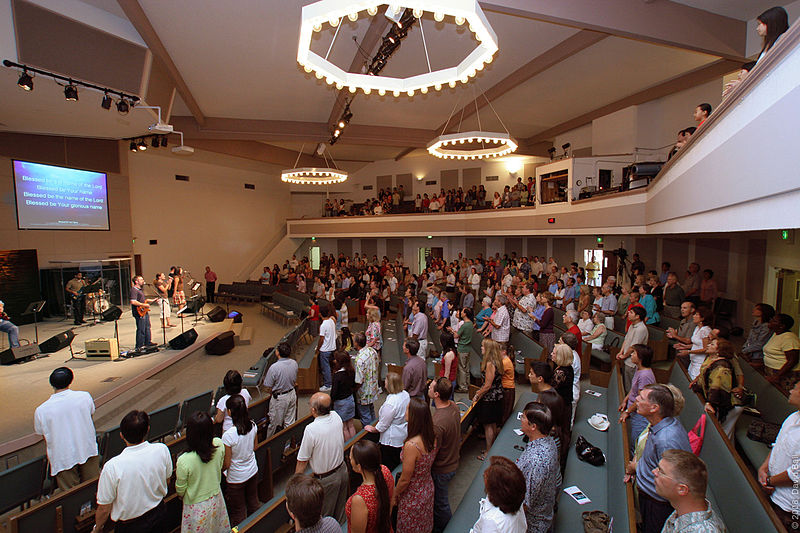(前編を読む)
特に福音派について私が予測しているのは、主流派に起こったことが起きるということだ。伝道に魅了されればされるほど、教会の低迷を治す薬として、それをより多く使うようになり、ますます病気になる。そして、多くの教会員はイライラするようになり、多くの人が教会を去る。その兆候はすでに見えている。
[toggle]What I predict for evangelicalism in particular is what I’ve seen happen to the mainline. The more we are fascinated with the missional, the more we take this medicine as the malady of church sluggishness, the sicker we are going to become. And the more people in our midst will become frustrated. And that will lead to more people leaving the church. We already see signs of it. [/toggle]
マイケル・リンジー学長(自身のツイッターから)
10年以上前、ゴードン大学のマイケル・リンジー学長は、福音派文化のインフルエンサー(影響の大きい人)についての調査、『権力の落とし穴への信仰──どのように福音派がアメリカン・エリートに加わったか』という本を書いた。その調査の過程で、多数の福音派の人々が政府や教育、娯楽の主要な文化施設に入り込み、実際に世界をより良くしていることを発見した。しかし、彼らがほとんど地元の教会とつながっていないことにも気づいた。
[toggle]Over ten years ago, Gordon College president Michael Lindsay researched and wrote a now-classic survey of evangelical cultural influencers—Faith in the Halls of Power: How Evangelicals Joined the American Elite. In the course of his research, he discovered that a large number of evangelicals were embedded in key cultural institutions—government, education, entertainment, and so forth—and that they were, in fact, making a difference in the world. But he also noticed how few of them were connected to a local church. [/toggle]これらの文化的指導者が、霊的成長のためではなく、世界がより良くならないために、地元の教会は関係がないと思っていたと推測してみよう。その本によると、「霊的だが宗教的ではない」と自認する人々が増えただけであり、このグループのクリスチャンは教会にコミットすることが少ないというが、私もそうだろうと思う。
[toggle]Let me hazard a guess that these cultural leaders found the local church irrelevant, likely both to their own spiritual growth but also because it was not making a difference in the world. Since that book, the number of those who identify as “spiritual but not religious” has only increased, which suggests that the Christians in this group are even less committed to the church, and I suspect for the same reasons. [/toggle]ある教会が生命維持装置につながれ、ある教会が霊的な社交クラブになっていることは疑いようがない。教会によっては、肉体的、心理的、霊的にメンバーを傷つけ、虐待さえしている。そうした無理もない理由で、人々は教会を去り、何年も戻ってこないのだろう。しかし大部分は、「教会が世界をより良くするのに十分なことをしていない」と考えて福音派の教会を去っているのではないか。
[toggle]There is no question that some churches are on life support, and some have become spiritual social clubs. Some churches have hurt, even abused, members physically, psychologically, or spiritually. Those are understandable reasons to leave a church and not come back for years. But I suspect a high percentage of people who leave evangelical churches do so because they do not think the church is doing enough to make a difference in the world. [/toggle]聖人が作られる場所
[toggle]Where Saints Are Made [/toggle]これらの伝道的な福音派エリートと、自らを「宗教的ではなく霊的だ」と自称する活動家を善意に解釈したい。これらのクリスチャンが世界ですることは正しく、善であり、本当に尊敬されることだ。彼らが隣人を愛することには感動させられる。
[toggle]I want to give the benefit of the doubt to these missional evangelical elite and the activists who describe themselves as spiritual-but-not-religious. What these Christians do in the world is right and good and truly to be admired. They are indeed loving the neighbor in inspirational ways. [/toggle]しかし私が心配しているのは、非常に多くの人が、神の目的を世界のために具現化しているただ一つの場所を見捨てたことだ。そして悲しいことに、愛について教えられる唯一の場所から自分を取り除いたのだ。それは、ほかの場所ではできないことなのに。
[toggle]What concerns me is that so many have deserted the one institution that embodies the very purpose of God for the world. And what saddens me is that they have removed themselves from the one place that can teach them about love as can no other. [/toggle]パウロによれば、教会はあらゆる種類の罪と信条と民族と人種と強さと弱さで構成されているが、キリストにあって一つだ。こう考えると、教会以外、地球上のどこにも、愛の中で生きることを学ぶのに適している場所があるとは私には考えられない。
[toggle]In Paul’s vision, the church is composed of people of all stripes and sins and persuasions and ethnicities and races and strengths and weaknesses but united in Christ. Given this, I can think of no institution on the planet is better situated to learn to live in love. [/toggle]この時点で、教会の理想的な絵を描きたいという誘惑がある。しかし、それこそまさに私たちがしてはいけないことだ。その聖書のビジョンを試すために、教会がその理想に生きるのを待つ必要はない。自分の教会のことを考えてほしい。そうすれば、私が何を言いたいかが分かるだろう。
[toggle]One is tempted at this point to paint the ideal picture of the church. But that is precisely what we must not do. We don’t have to wait for the church to live into its ideals to see that it already is the testing ground for the biblical vision. I only have to ask you to think about your own church, and you’ll get the point. [/toggle]どの教会にもおそらく、聖書を文字どおりに読み、聖書から証明されていないことをすべて批判する律法主義者がいるだろう。教会学校で献身的に奉仕しているが、あなたについての噂(うわさ)も含まれるゴシップに弱い女性がいるだろう。また、冷却時間を持つために別居している夫婦もいるだろう。伝道委員会で、伝道か社会的正義のどちらにより多くのお金を使うべきかについて、時には激しく主張を繰り返す人もいるだろう。あなたは、副牧師が飲酒の問題を抱えていると疑っているかもしれない。また、環境問題に熱心すぎる教会員と仲良くしたことがないかもしれない。
[toggle]Your church probably has a Max, a legalist who reads the Bible literally and endlessly criticizes everything that isn’t proven from the Bible. Then there’s Marjorie, a woman who works mightily in Sunday school but whose weakness is gossip, some of which you’ve been the subject of. Then there’s that couple, David and Barbara, separated while they try to work things out. On the mission committee, Doris and Jim repeatedly argue, sometimes not charitably, about whether to give more money to evangelistic or social justice causes. You also suspect the associate pastor may have a drinking problem. And you’ve never gotten along with Scott because he’s so fanatical about the environment. [/toggle]
〔写真:David Ball〕
そして、それは続く。それでも毎週日曜日、あなたはイエス・キリストを礼拝するために、この雑多な乗組員と一緒に集まる。告白の祈りを一緒にささげ、キリストにあって一つと賛美歌を歌い、唯一の神と聖なる公同の教会についての信仰告白を暗唱し、愛のしるしとして互いに平和の挨拶(あいさつ)をかわす。あなたはまた、これらの人々と一緒に委員会に出席し、聖書研究に参加し、何人かと共にホームレスの避難所で食事を提供するだろう。あなたは、イエスを中心としたコミュニティーの中で彼らと一緒に暮らしている。そこはきれいでもなく、栄光もない。しかし、そこは愛の製造所であり、神に会い、人間関係に耐え、働き、そして喜ぶ場所。聖人が作られる場所なのだ。
[toggle]And on it goes. And yet every Sunday, you gather together with this motley crew to worship Jesus Christ. You pray together a prayer of confession, you sing hymns that speak of your unity in Christ, you recite the creed about a God who is one and a church that is holy and one, you pass the peace to one another as a sign of your love. You also sit on committees with these folks and attend Bible studies and serve food at the homeless shelter with some of them. You live with them in something resembling a community centered on Jesus. It’s not pretty. It’s not glorious. But it is a laboratory of love, where God is met, relationships are endured, worked at, and rejoiced in. It’s a place where saints are made. [/toggle]そして、教会外で隣人を愛することを定期的に思い出させてくれる場所でもある。忘れないでほしい。隣人を愛することが教会の主な目的ではないということは、弟子たちへの2番目に大切な教えを否定するものではない。だから教会は、教会外の人たちのために犠牲を払うことと同様、簡単なもてなしをすることを勧めている。ハビタット・フォー・ヒュマニティー(誰もがきちんとした場所に暮らせる)精神でボランティアをすること、そして地元の食料品店やホームレスの避難所にスタッフを送ることを奨励する。たぶん何人かの教会員は政治家になるか、警察官になるか、都心で教師になるだろう。医者や弁護士、食料品店主、庭師になる人もいるだろう。これらの人はすべて、月曜日から金曜日まで、世界をより良い場所にするために、さまざまな職業で、主の御霊によって働いている。
[toggle]It’s also the main place that regularly reminds us to love our neighbors outside our church. Let’s not forget that. The fact that loving the neighbor is not the church’s primary purpose does not mean it is not still the second great commandment for disciples. So the church encourages its members to practice simple acts of hospitality as well as acts of sacrifice for those outside the church. It encourages us to volunteer with Habitat for Humanity and to staff the local food pantry and homeless shelter. Perhaps some church members will run for Congress or join the police force or teach in the inner city. Some will become doctors or lawyers, others grocers and gardeners—all of whom on Monday through Friday work in the Spirit of the Lord in their various vocations to make the world a better place. [/toggle]しかし、本当に難しいことをしたいのなら、そして自分を限界まで追い込みたいなら、愛によって常に試されたいなら、究極の目的のうちに生きたいなら、神の前で愛のうちに聖なる者、汚れのない者であることを学びたいなら、地元の教会ほど良い場所はない。
[toggle]But if you want to do something that is really hard, and if you want to push yourself to the limits, if you want to be constantly tested by love, if you want to live into your ultimate destiny—if you want to learn to be holy and blameless in love before God—there is no better place to do that than in the local church. [/toggle]今日、私たちの多くは、教会の大きな欠陥をはっきりと指摘しているが、そのほとんどは表面的に要約できる。「教会は宣教的でなければならない」「世界が快適に感じる場所でなければならない」と考えているので、説教と礼拝を簡略化した結果、さまざまな意味でありふれたキリスト教になってしまった。堕落するのは簡単だ。非常に多くの人々を魅了し、多くの教会が成長している理由はそれだ。しかしそれは、神の民の成長を妨げるように作られた食事だ。そしてそれは、最終的に人々を燃え尽きさせる教会生活の方法であり、そこで人々は世界をより良い場所にしようとして疲れ果てている。
[toggle]Many of us today rightly note the great defects in the church, most of which boil down to its superficiality. Because the church thinks it has to be missional, that it has to be a place where the world feels comfortable, it has dumbed down the preaching and the worship, so that in many quarters we have ended up with a common-denominator Christianity. It goes down easy, which is why it attracts so many and why many churches are growing. But it is a meal designed to stunt the growth of the people of God. And it is a way of church life that eventually burns people out, where people become exhausted trying to make the world a better place. [/toggle]その代わり、教会が聖所であり、休息と癒やしと生活の場であり、信じる者が愛のうちに共に住む場所、神の前で愛のうちに聖なる者であり汚れない者となることを学ぶ場所だったらどうだろう。そして、新しい何らかの美しいビジョンに遭遇して、仕事と宣教のために教会から出て、教会外の隣人に仕え、神の恵みによってその世界を良くしたとしたらどうだろうか。
[toggle]What if instead the church was a sanctuary, a place of rest and healing and life, where the fellowship of believers lived together in love, where we just learn to be holy and blameless in love before God? And what if, having encountered afresh some sort of beatific vision, we go out from church in our vocations and ministries, serving the unchurched neighbor and, by God’s grace, make a difference in their world? [/toggle]教会で愛を学ぶことは、それほど簡単なことではない。しかし、愛を学ぶことは自己治癒的な性質がある。失敗すればするほど、神と人に赦(ゆる)しを求め、人生を変える恵みの力を吸収するのだ。
[toggle]It’s not that learning to love in the church is all that easy. But learning to love has this self-generating quality: The more we fail, the more we turn to God and the people of God for forgiveness and thus imbibe the life-changing power of grace. [/toggle]この聖書のビジョンがより多くの教会に定着すれば──それはすでに多くの場所に見られるが、私たちは意義深い変化を見ることができると私は信じる。教会はもはや、世界との関係で適切であるかどうかを案じたり心配したりする場所ではない。「社会の規範によって状況を改善することができない」と心配することはない。教会は「有用な目的を達成するための手段」ではなく、「人類にとっての神の目的」と考えるのだ。つまり、共和党と民主党、金持ちと貧しい人、男性と女性、白人とスパニックと黒人とアジア人が愛のうちに共に住むことを学ぶ場所だ。神の栄光をたたえるために、すべてのすべてである「キリストの満ちあふれる豊かさになるまで成長する」(エフェソ4:13)ことを学ぶ場所なのだ。
[toggle]If this biblical vision settles into more and more local churches—and it’s already present in many places—I believe we would see some significant changes. The church would no longer be a place that is anxious and worried about being relevant to the world on the world’s terms; it wouldn’t worry about its inability to make a difference by society’s norms; it wouldn’t think of itself as means to a useful end but God’s end for humanity. That is, a place where we learn to live together in love—Republican and Democratic, rich and poor, male and female, white and Hispanic and black and Asian. Where we would learn to grow up into the stature and fullness of Christ, who is all in all, to the praise of God’s glory. [/toggle]そして何よりも、神の栄光を賛美することについて知るための、すべてのことを学ぶ場所になるだろう。賛美の高度なわざを学ぶ場所に。来るべき救いのために神を賛美するあらゆる形式の音楽と言葉とドラマと朗読と視覚芸術が用いられる場所に。世界の国々が新しいエルサレムに押し寄せたとき、彼らは歌うべき歌を歌い、唱えるべきことを唱え、愛のうちに彼らを集めてくださった神を賛美する言葉を持つようになる。
[toggle]And more than anything, it would become a place where we learn everything there is to know about praising God’s glory, a place where we learn the fine art of praise, a place that would employ every form of music and word and drama and reading and visual art to praise God for his coming salvation, so that when the nations of the world flood into the New Jerusalem, they will have songs to sing and chants to chant and words to praise the God who has brought them together in love. [/toggle]執筆者のマーク・ガリは「クリスチャニティー・トゥデイ」の編集長。
本記事は「クリスチャニティー・トゥデイ」(米国)より翻訳、転載しました。翻訳にあたって、多少の省略をしています。
出典URL:https://www.christianitytoday.com/ct/2019/june-web-only/churchs-sickness-unto-death.html
